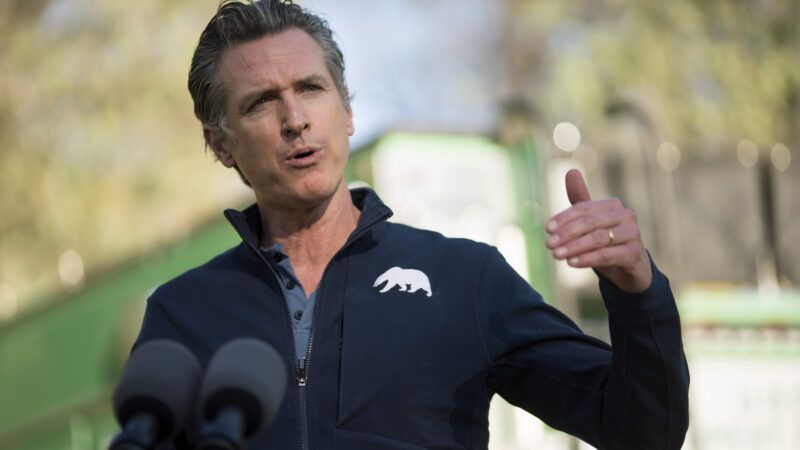Gavin Newsom Vetoes Bill Legalizing 'Safe Consumption Sites' in 3 California Cities
The California governor argued that the bill could lead to "a world of unintended consequences."

On Monday, Democratic California Gov. Gavin Newsom vetoed a bill legalizing "safe consumption sites" in Los Angeles, San Francisco, and Oakland. Safe consumption sites, also known as "safe injection sites," are locations where individuals can use illegal drugs in a sanitary area with access to clean needles and staff who can administer drugs like naloxone, which can quickly treat an overdose. Proponents of the legislation argue that the sites are an important harm reduction tool, helping to prevent overdose deaths or the spread of certain diseases, like HIV, that can be spread through intravenous drug use.
"Safe injection sites aren't intended to be some sort of magic solution to a chronic drug addiction crisis; they are intended to reduce the likelihood of users dying," Reason's Scott Shackford wrote after the bill's passage in the state Legislature earlier this month.
Where safe consumption sites are legal, they have proved tremendously effective. As of 2019, one safe consumption site in Vancouver, Canada, has overseen more than 3.6 million instances of drug injection since its opening in 2003. At the site, staff responded to 6,440 overdoses with no deaths. A study examining the site's operations from 2004 to 2008 predicted that, during that period, the site prevented up to 51 deaths. According to NPR, researchers also found no increase in drug usage in the surrounding area.
"Safe consumption sites have been in operation around the world for approximately 30 years, with great success and literally zero overdose deaths," state Sen. Scott Wiener (D–San Francisco), who originally introduced the bill, told CBS Bay Area. "These sites are a proven strategy to reduce overdose deaths, pressure on emergency rooms, and public drug use, while expanding access to drug treatment"
However, Newsom seems unconvinced that safe consumption sites will help the state's drug users. "I have long supported the cutting edge of harm reduction strategies," Newsom wrote in a statement explaining his veto of the bill. "However, I am acutely concerned about the operations of safe injection sites without strong, engaged local leadership, and well-documented, vetted, and thoughtful operational and suitability plans." Newsom further expressed concerns that the bill could lead to "a world of unintended consequences… worsening drug consumption challenges in [Los Angeles, San Francisco, and Oakland] is not a risk we can take."
"It's tremendously frustrating that safe injection sites have met continued resistance at the federal and state levels, including in supposedly liberal states like California," Geoffroy Lawrence, the managing director of drug policy at Reason Foundation (the nonprofit that publishes this website), tells Reason. "While safe injection sites may sound counterintuitive to some people as an effective means to combat addiction, there's no arguing with the data. Results from other countries have shown that safe injection sites lead to a reduction in overdose deaths and transmission rates of infectious disease and an increase in the number of individuals seeking addiction recovery."
It is possible that Newsom's veto of the bill has little to do with the efficacy of safe injection sites and instead is the result of his preparation for a possible presidential run in 2024. On July 4, he placed political ads on several Florida television stations, criticizing Republican Florida Gov. Ron DeSantis, also a possible presidential contender. With cities like San Francisco and Los Angeles gaining attention in national media for their homelessness crisis (which is associated with drug use), Newsom could be eager to present a more anti-drug, even "tough on crime" image.
Newsom's presidential ambitions, or simply his desire to appear less soft on crime, might be getting in the way of a safe and effective public health strategy for preventing drug overdoses.
"The American approach to the drug war has historically been about restricting supply when changing demand was always the better approach," said Lawrence. "That's what so-called 'harm reduction' policies, including safe injection sites, are all about."


Show Comments (22)